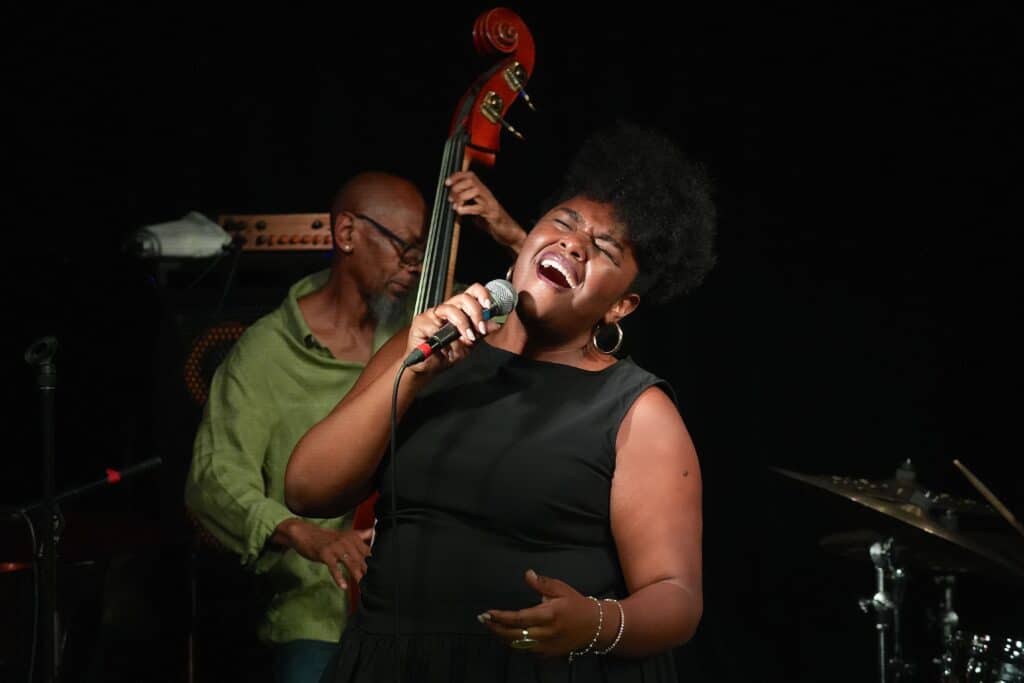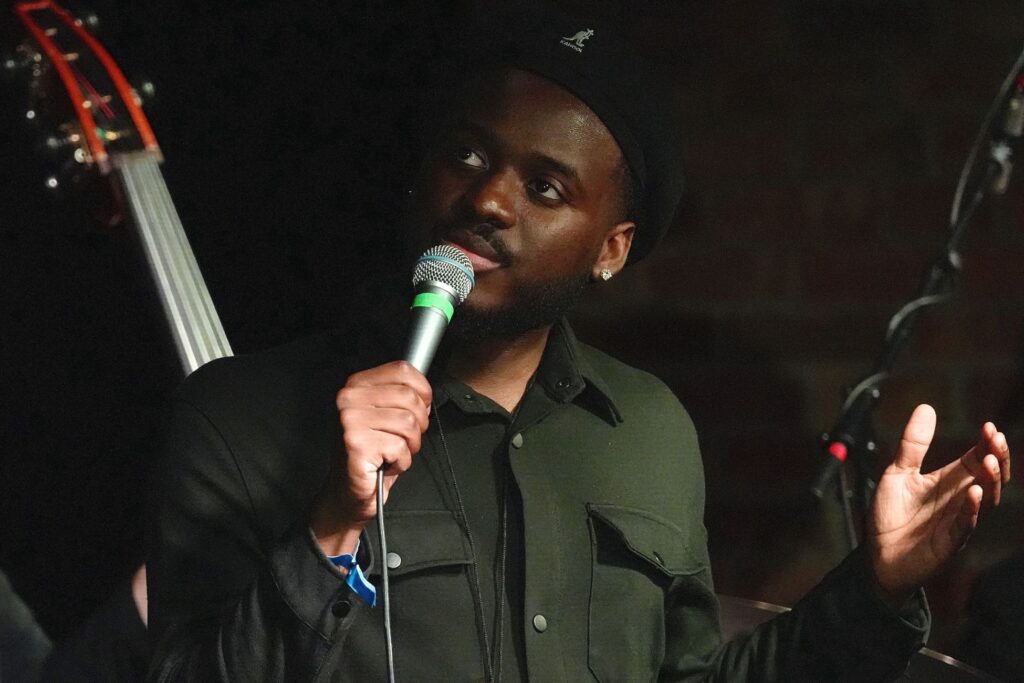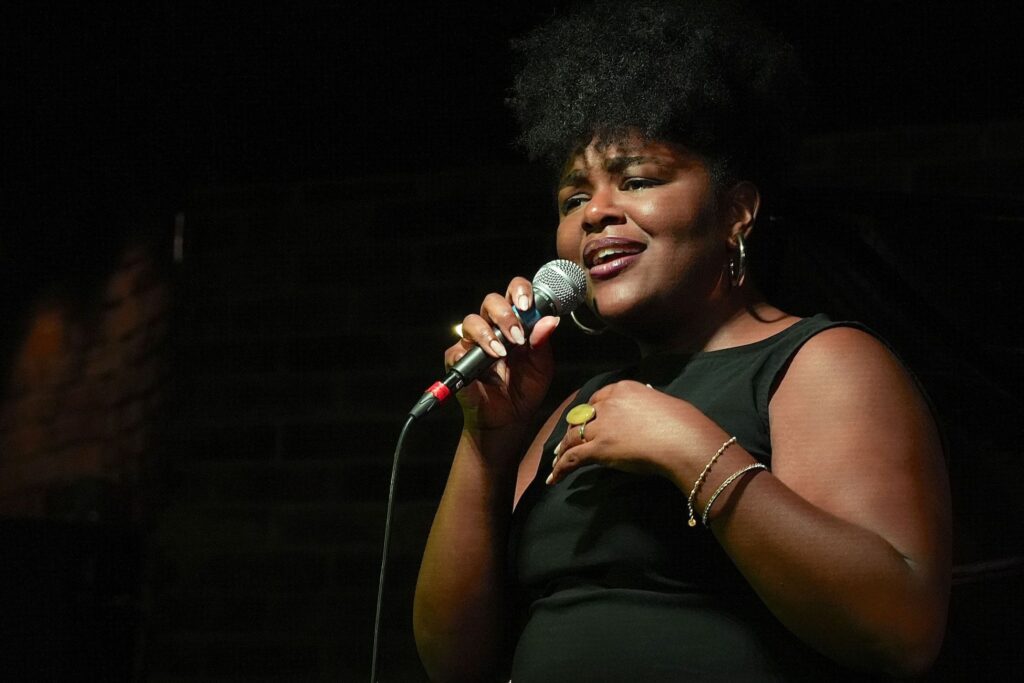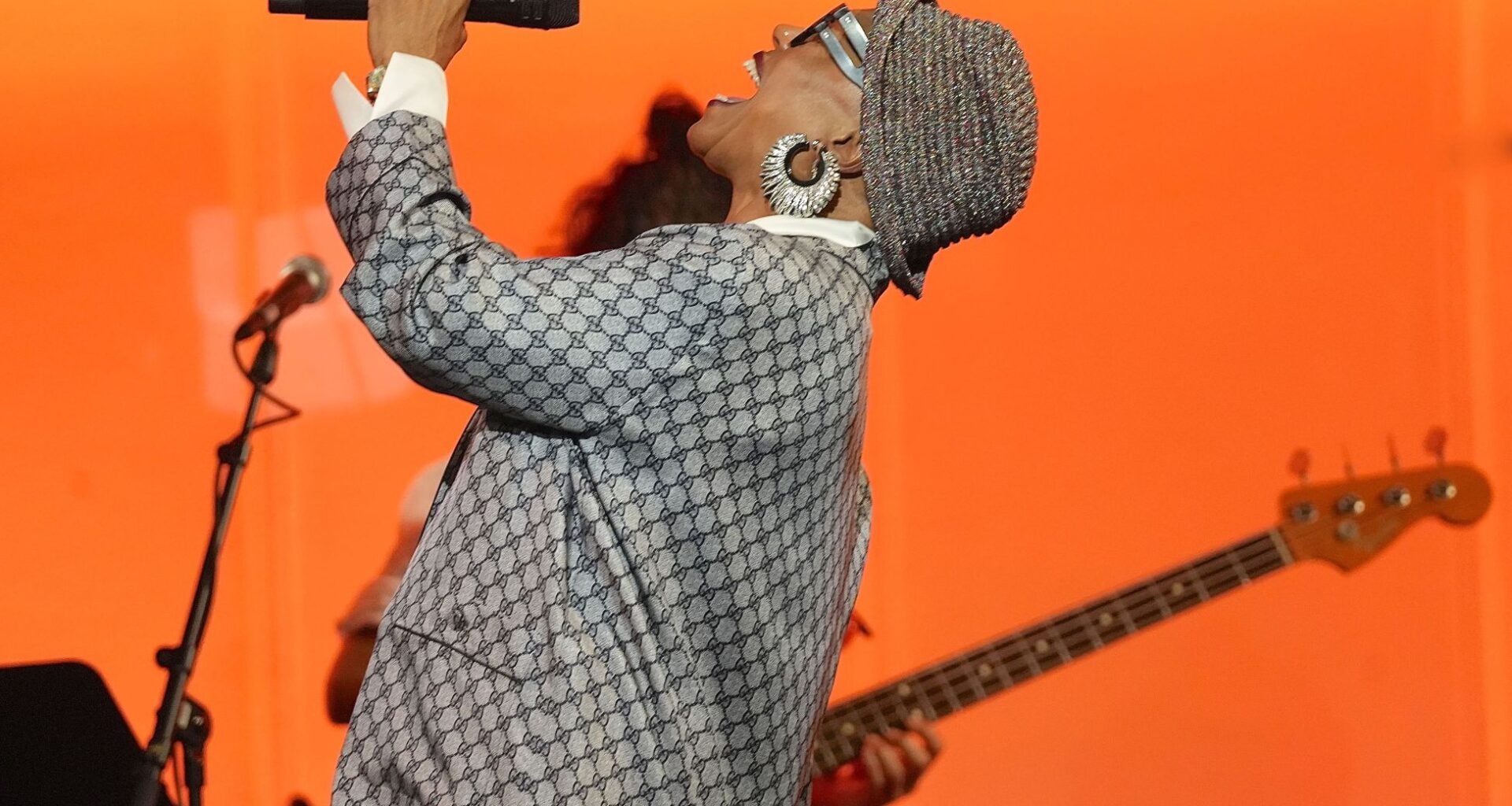There was, as Oliver Hochkeppel, Artistic Director of the Münchner Jazzsommer at the Bayerischer Hof has explained, one reason why he chose the theme ‘Voices’ for this year’s edition: Christie Dashiell…because she is culpably underrated as a solo artist by the music industry. And, from the stage of the Night Club, the singer from Washington D.C. did indeed come across as an artist with impressively comprehensive versatility. She has soul, bebop and blues in her armoury, but concentrated here on the school of the great voices and the tradition of the swing divas. There was a lot on offer: good original songs, a great deal of empathy and musical intimacy, as in the song ‘Brothers & Sisters,’ which developed into a gospel-tinged hymn to humanity, as well as an excellent band with pianist Alan Johnson, bassist Reggie Washington and drummer Yoram Vroom. If anything was missing on this occasion, it was to find a moment when she might do something definingly unique.
 Bassist Reggie Washington with Christie Dashiell, Munich 2025. Photo (c) Ralf Dombrowski
Bassist Reggie Washington with Christie Dashiell, Munich 2025. Photo (c) Ralf Dombrowski
Christie Dashiell did shine, but she had neither the anger nor the extravagance with which Dee Dee Bridgewater took many by surprise at the opening of the festival in the Festsaal. The diva from Memphis set the bar high. She was part of an all-female team with the equally outstanding pianist Carmen Staaf, bassist Rosa Brunello and drummer Shirazette Tinnin, and she insisted on ‘We exist!’ as the motto of her programme, a tribute to strong women from Mary Lou Williams and Nina Simone to Billie Holiday and Abbey Lincoln. At 75, Bridgewater not only looked younger and more energetic than many other artists at the festival, she also had more anger as she railed against misogyny, racism, inhumanity in general and current masculine ignorance in particular. It can be painful to witness artists today having to apologise on stage for the state their home country is in. But it is also possible to convey the message – as Dee Dee Bridgewater did – that you are fighting against stupidity with fundamental democratic conviction.
By comparison, the other concerts of the Jazz Summer ranged from the beautiful, tasteful and entertaining to the somewhat staid. Tyreek McDole, for example, hinted at the presence a big beautiful voice, but had a tendency to slightly bury himself within the activity of an over-exuberant band with soloists who would occasionally overstay their welcome – saxophonist Dylan Band comes to mind. Lars Danielsson had the role of official sound aesthete of the festival with his Liberetto programme. Singer Alma Naidu, with guest vocalist/guitarist Torsten Goods, made the connection to funk and fusion. The jazz department of the pop group Söhne Mannheims paid homage to long-standing heroes such as Stanley Clarke and Kate Bush and, with singer Dominic Sanz, provided us with a link to the listening habits of the pop singles charts.
Saxophonist Katharina Pfeifer, included in the festival as its pre-opening act, linked the Jazzsommer to the young Munich scene, and that is a cause for celebration. There was something for everyone here: young artists and star guests, newcomers and established artists, old school and chamber jazz, parties, hits, everything. And the fact that the Jazzsommer at the Bayerischer Hof operates without any public subsidy sends out a clear message: when different parts of a scene get involved and get engaged, there is always going to be something good coming from it.
 Tyreek McDole, Munich 2025. Photo (c) Ralf Dombrowsi
Tyreek McDole, Munich 2025. Photo (c) Ralf Dombrowsi
Ralf Dombrowski’s original German text:
Eigentlich, meinte Oliver Hochkeppel, der künstlerische Leiter des Jazzsommers im Bayerischen Hof, habe er das Thema „Voices“ vor allem wegen Christie Dashiell gewählt. Denn sie werde im Musikbetrieb als Solo-Künstlerin bislang sträflich unterschätzt. Tatsächlich präsentierte sich die Sängerin aus Washington auf der Bühne des Night Clubs als umfassend wandlungsfähige Künstlerin. Sie hatte Soul, Bebop, Blues im Gepäck, konzentrierte sich aber auf die Schule der großen Stimmen in der Nachfolge der Swing-Diven. Es war vieles dabei, gute eigene Lieder, viel Empathie und musikalische Nähe wie im Song „Brothers & Sisters“, der sich zur gospelgetönten Hymne an die Menschlichkeit entwickelte, außerdem eine ausgezeichnete Band mit Pianist Alan Johnson, Bassist Reggie Washington und Schlagzeuger Yoram Vroom. Wenn überhaupt etwas fehlte, dann war es das Moment der Unverwechselbarkeit.
Denn Christie Dashiell war brillant, aber sie hatte nicht die Wut und auch nicht die Extravaganz, mit der Dee Dee Bridgwater zur Eröffnung des Festivals im Festsaal des Hauses viele überraschte. Die Diva aus Memphis setzte den Maßstab. Sie war im ebenfalls herausragenden Frauenteam mit Pianistin Carmen Staaf, Bassistin Rosa Brunello und Schlagzeugerin Shirazette Tinnin unterwegs und sie bestand auf „We exist!“ als Motto ihres Programms, eine Widmung an starke Frauen von Mary Lou Williams und Nina Simone bis Billie Holiday und Abbey Lincoln. Sie wirkte mit 75 Jahren nicht nur jünger und energischer als manch andere Künstler:in des Festivals. Sie war auch wütender und sang gegen Misogynie, Rassismus, gegen Unmenschlichkeit im Allgemeinen und aktuelle maskuline Ignoranz im Speziellen an. Es ist bitter, wenn Künstler:innen sich heute für ihre Heimatland auf der Bühne entschuldigen müssen. Aber man kann es eben auch mit der Botschaft versehen, bitteschön und mit grunddemokratischer Überzeugung gegen die Dummheit anzukämpfen.
 Christie Dashiell. Photo (c) Ralf Dombrows
Christie Dashiell. Photo (c) Ralf Dombrows
Im Vergleich dazu wirkten die anderen Konzerte des Jazzsommers mal schön und geschmackvoll, mal unterhaltsam oder auch brav. Tyreek McDole etwa ließ zwar eine große und schöne Stimme erahnen, verlor sich aber ein wenig in einer überspannt agierenden Band mit redundant solierenden Kollegen wie dem Saxophonisten Dylan Band. Lars Danielsson war mit dem Liberetto-Programm der amtliche Klangästhet des Festivals. Die Sängerin Alma Naidu schaffte mit Vocal-Gast und Gitarrist Torsten Goods die Verbindung zu Funk und Fusion. Das Jazzdepartment der Pop-Gruppe Söhne Mannheims huldigte alten Helden wie Stanley Clarke oder Kate Bush und bot mit Sänger Dominic Sanz den Link in die Hörgewohnheiten der Pop-Charts.
Die dem Festival als Voreröffnung angegliederte Saxophonistin Katharina Pfeifer verknüpfte den Jazzsommer zusätzlich zu Alma Naidu noch mit der jungen heimischen Szene und so konnte sich Oliver Hochkeppel am Ende zufrieden an den Bar einen Drink gönnen. Denn es war von allem etwas dabei, Jugend und Stargast, Newcomer:innen und etablierte Künstler:innen, Old School und Kammerjazz, Party und Hits. Und damit setzte der ohne öffentliche Subventionen agierende Jazzsommer im Bayerischen Hof auch ein Zeichen nach dem Motto: Hallo Szene! Engagiere dich, kümmert euch! Dann wird etwas daraus!
